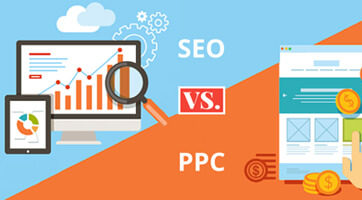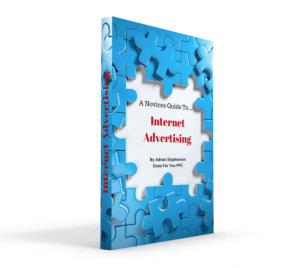Over the years I have spoken to many business owners at networking meetings and, surprisingly, the majority of them seem to be confused between PPC (Pay-Per-Click) and SEO (Search Engine Optimisation).
I generally explain it as if it is a journey from say, London to Edinburgh. There are two ways that this can be completed, either by car or by train. Both end up with the same outcome; however they are very different ways of getting there.
And it’s the same with PPC and SEO. Both are designed to get your website found by potential customers.
So where can we see PPC (pay per click) in action?
It appears in many facets and not just Google Adwords. It can also be found on Bing/Yahoo and YouTube, then LinkedIn, Facebook and even Twitter. Adwords also has a Display network, where ads appear on third party sites, and both Google and Bing have Shopping networks. All of these come under the PPC umbrella.
Conversely, SEO is limited to the search results typically found on Google and Bing.
A further differentiation is the amount of time that it takes for either PPC or SEO to work.
Whereas PPC is almost instant, SEO is a longer-term strategy.
PPC can, and sometimes does, produce results overnight, whereas SEO can take several months or longer before it starts to bear fruit.
Keywords
Another aspect which both share, but that are different in usage, is with keywords.
PPC in the form of Adwords and Bing Ads is mostly driven by keywords, although there are exceptions – Google Shopping for instance – but the crucial point is the number of keywords that can be used is virtually limitless, giving endless opportunities to pursue very specific markets.
SEO also uses keywords, but in a more limited fashion. Whereas PPC campaigns have a bottomless pit for keywords, SEO tends to be restricted to 6 to 12 because of the costs associated with promoting each keyword.
There was a time when SEO could be carried out using ‘keyword stuffing’. However Google realised this led to web pages full of keywords, that made for a very poor reader experience, so outlawed the practice.
Content Marketing
These days content is king, and to be effective with SEO it’s important to write plenty of articles and regular blogs.
Google likes fresh content and sees it as enhancing relevance, although this can clash with the user experience. Nobody wants to read through huge chunks of text when they are in a hurry to find something specific.
Algorithms
A further differentiation is that with SEO, Google uses algorithms to determine where websites get ranked. These are based around formulae, and are not published. Hence the perpetual guessing game as to what is needed to rank highly for any given keyword.
The problem is that, from time to time, Google will change the algorithms without making it widely known. This is why websites can fall from the number one position right down to the lower pages, literally overnight!
Fortunately algorithms do not feature in PPC in the same way.
However there is a set of rules that need to be followed, some of which are fairly vague and open to interpretation. This means that there are times when it is extremely difficult to work out why a keyword might not be performing within Adwords.
Cost Structures
At this stage it is worth mentioning the difference in cost structures between the two disciplines.
With SEO, conventionally businesses will pay a specialist to optimise their website in order to obtain higher Google rankings. This is a service which is seldom cheap, but also difficult to monitor the return on investment.
Typically web designers will have a stab at some SEO on behalf of their client. Although this is probably not a particularly wise move as a website designer is rarely an SEO specialist; in the same way as a house builder is unlikely to be an interior designer!
With PPC, a daily or monthly budget is set and this will not be exceeded. On top of that agencies charge fees, meaning that it is possible to establish the overall cost of advertising and measure it against the income achieved from PPC campaigns.
Of course it’s possible to do your own SEO and PPC. The downside to which is that there is a huge amount to learn, and if you get it wrong, you can easily spend a significant amount of money without any gain.
So which is better?
Well, both are essential marketing pillars, and in my opinion it is indisputable that businesses should use both strategies to achieve their marketing objectives.
Nevertheless, like having children, they come with advantages and disadvantages.
Whilst PPC can be quick to start earning revenue, by the same token it can take time before the ideal balance is reached.
During this time experiments are taking place which costs the advertiser money in the form of unwanted clicks. Remember, the term ‘pay per click’ applies to all clicks – not just the ones that make you a profit!
However PPC is fairly nimble and can be used to great advantage when new products and services are brought in to take them to the marketplace quickly. It can also be turned off, so if you find that you have too much business to deal with, it’s easy to press the pause button.
The big plus with SEO on the other hand is that it is free – to the extent that the marketer doesn’t pay for clicks. However the real cost is in the time that it takes their SEO agency to get them to the top of the Google organic rankings.
What’s best for my business?
Although all business are different they share one common denominator – they all need sales to survive. And whilst there are plenty of off-line methods of bringing in sales, only a complete Luddite would ignore the internet.
A question which I frequently get asked is, ‘should you do PPC if your website is already high in the organic listings?’
Unhesitatingly my answer is always yes. For two good reasons:
Firstly by being seen in both the top and lower sections of search results it adds credibility to the business and their products and services. It also occupies space which might otherwise be occupied by competitors.
Secondly PPC acts as a safety net in case of any algorithm changes. So, should the worst happen and Google changes the rules, then at least your website will still be found within the paid-for ads.





